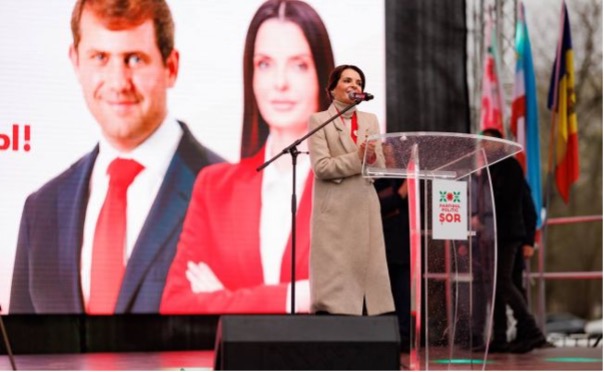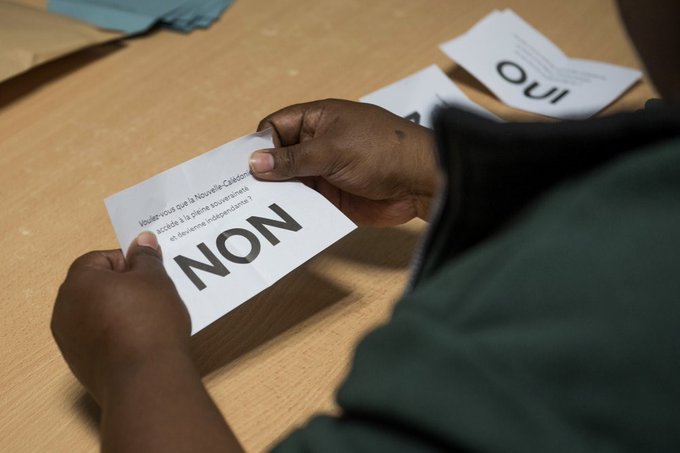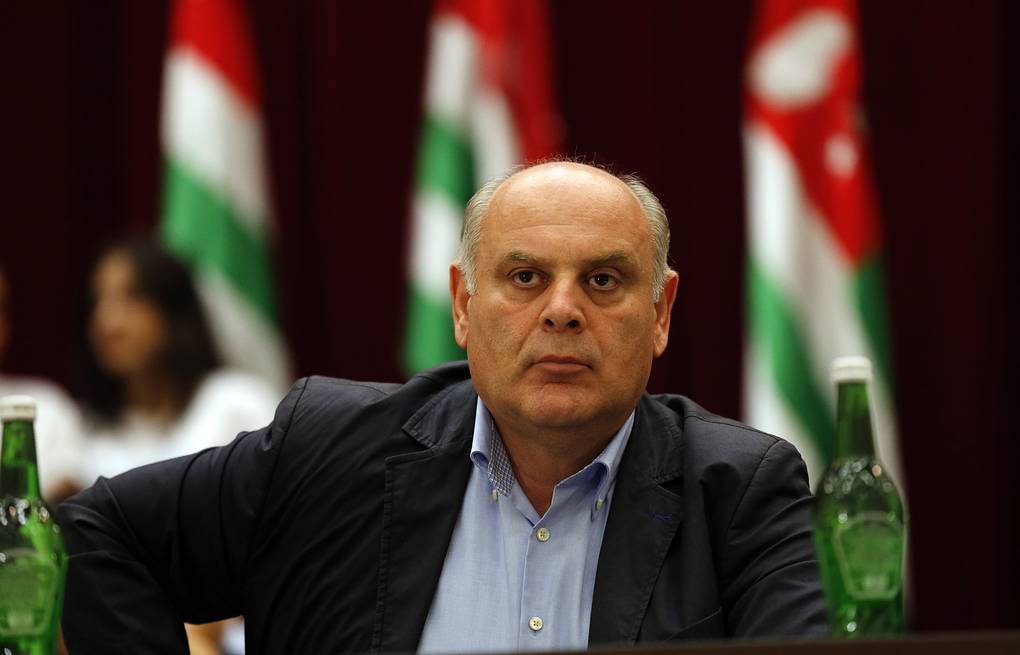2025 Presidential Elections in Northern Cyprus: Renewed Path to a Solution or Resumption of the Status Quo?
On 19 October 2025, the Turkish Cypriots went to the polls to elect their new president. As usual, the discussions in the build-up to the elections revolved around where the future of the Turkish Republic of Northern Cyprus (TRNC) lies. While at first glance the elections might seem like another heated battle in the inexhaustible war between the two-separate-state and federalist arguments, the situation on the island reflects a different reality, one that signals that this will be a continuation of the status quo.
The champions of the two arguments this time were the incumbent president Ersin Tatar, representing the conservative, “realist” two-state solution side, and Tufan Erhürman, who advocated for a re-opening of the talks between the Turkish and Greek Cypriots for a federated solution. The discussion around what the elections mean for the domestic politics of TRNC, its relations with Türkiye and prospects for conflict resolution should not omit the insurmountable facts which are that TRNC is heavily dependent on Türkiye economically and militarily, and that the unresolved conflict itself fuels the politics of both sides and their close allies.
The main competitors
Ersin Tatar: the incumbent
As the incumbent president, Ersin Tatar ran as independent (as TRNC law prohibits an incumbent from running in elections with a political party) without rejecting his ties to National Unity Party (UBP) on a platform that defended his record and vision: the TRNC as a sovereign, equal, and independent state. Since his first term began in 2020, Tatar had consistently rejected the decades-long federal negotiation model, claiming that “the federation is over.” In 2025, he maintained that the two-state policy was not merely an alternative, but the only viable solution after years of failed talks with the Greek Cypriot side. He warned that a return to the federal framework would demote the Turkish Cypriots to a minority.
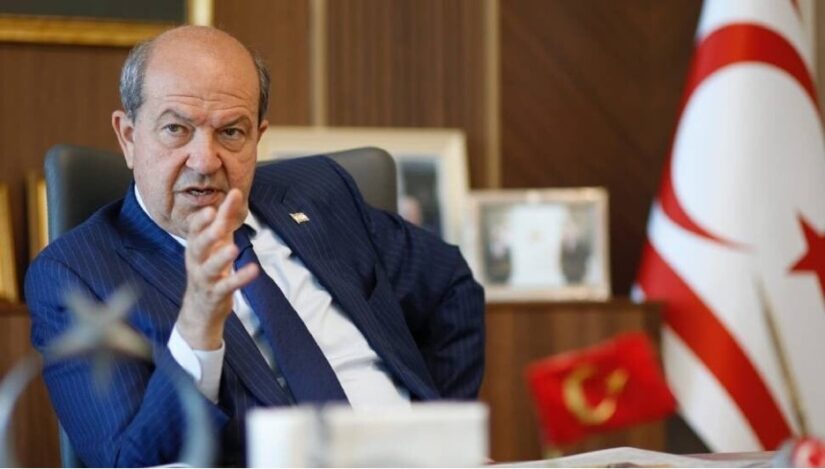
Image: Ersin Tatar, the incumbent president (Source: Kıbrıs Postası)
Tatar’s campaign speeches emphasized gratitude toward Türkiye and President Erdoğan and the importance of unwavering coordination with Ankara. He presented Türkiye as the guarantor of security and prosperity, citing joint projects such as the water pipeline, energy interconnection plans, and tourism investments. Framing himself as the protector of national will, Tatar accused his opponents of offering unrealistic ideas that could weaken the TRNC’s hard-won sovereignty. His message was clear: security, identity, and sovereignty were non-negotiable, and only a leadership fully aligned with Türkiye could safeguard them.
Tufan Erhürman: the federalist reformer
Tufan Erhürman, leader of the Republican Turkish Party (CTP), entered the race as the main opposition figure promisingcompetent, transparent, and internationally credible governance. A constitutional lawyer and former prime minister, Erhürman represented the social-democratic and pro-federation wing of Turkish Cypriot politics. At the heart of his campaign was a commitment to reviving peace negotiations under UN parameters for a bi-communal, bi-zonal federation— not as an act of naïveté, but as a pragmatic attempt to overcome the island’s deepening isolation. Erhürman argued that disengaging from the international community and anchoring all political legitimacy in Ankara had not improved Turkish Cypriots’ lives; instead, it had left them economically strained and diplomatically cornered.
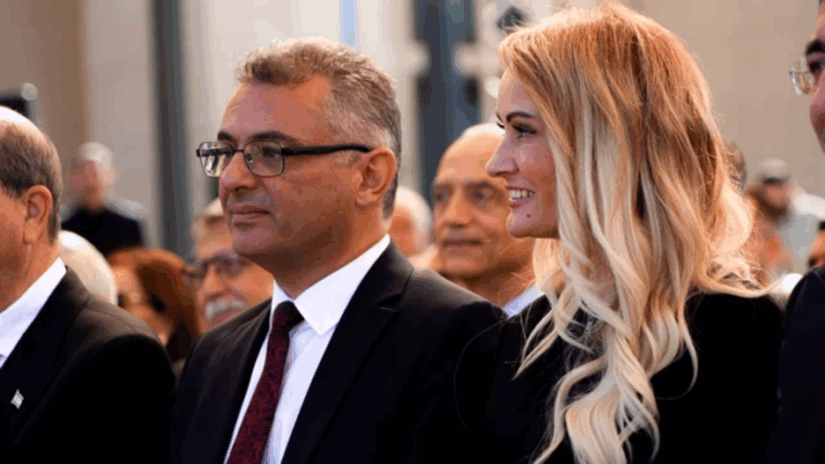
Image: Erhürman and his wife (Source: BBC)
His message focused on institutional reform, meritocracy, and the rule of law, calling for a serious and well-functioning state. Unlike Tatar, Erhürman avoided populist language. He underscored that relations with Türkiye would remain essential, and that his mission is to carry the relations between TRNC and Türkiye and their peoples to new heights.His message, invoking planning, discipline, and stability, captured a quiet but strong technocratic appeal: the belief that governance grounded in competence could restore both internal trust and international legitimacy.
Situation in Northern Cyprus leading to the elections
As of 2025, Northern Cyprus faces deep economic fatigue. Inflation, currency instability tied to the Turkish lira, and pandemic-era aftershocks have eroded living standards. Public frustration over housing prices, corruption, and patronage politics runs high. While Tatar positioned Türkiye as the lifeline through financial assistance, many voters grew uneasy about the price of dependency — the perception that external influence had begun to shape not only economic policy but also the island’s political direction. This created fertile ground for Erhürman’s message: that Northern Cyprus needed to govern itself better before seeking to redefine its international status. His campaign tapped into a widespread yearning for stability, professionalism, and a reduction in everyday uncertainty.
Although TRNC was accepted into the Organization of Turkic States (OTS) as an observer, five years of Tatar’s two-state diplomacy has not yielded international recognition, nor has it brought the TRNC closer to broader legitimacy. While some Turkish Cypriots sympathize with the sovereignty argument, others see the approach as symbolically strong but practically isolating. Since the collapse of the Crans-Montana talks in 2017, successive rounds of negotiations between the two communities have gone nowhere. The 2021 Geneva talks, where Tatar formally proposed a two-state model, ended without progress. Many citizens feel stuck between an unworkable federal process and an unrecognized independence push, fueling both cynicism and the desire for a reset.
Tatar was not a particularly successful president in terms of unifying the nation towards a common goal, and critics argued that local autonomy was eroding, claiming direct interventions in electoral processes and administrative decisions. Furthermore, during Ersin Tatar’s rule, scandals concerning money laundering issues that flourished in the TRNC and corruption allegations connected to swiftly expanding construction projects cast a shadow over Tatar’s run for this second term.
Although to outside observers the involvement of Ankara in Turkish Cypriot politics might seem decisive, Türkiye’s official position regarding TRNC presidents have always been supportive. Sometimes the debate might intensify, a good example of this was the back-and-forth between now ex-president Mustafa Akıncı and Turkish President Erdoğan. In the 2020 elections and during Tatar’s term, Türkiye openly supported Tatar. However, interpreting this as a political stance against federationists would be a critical oversight as Türkiye’s change of stance regarding the solution to the frozen conflict has more to do with its disillusionment with the EU following the premature acceptance of Cyprus into the EU without the Turkish Cypriots, the stagnation of accession talks, and the East Mediterranean tensions, and less with Turkish Cypriots themselves.
Portrayal of Erhürman by the media
The 2025 campaign unfolded in a polarized media environment. Pro-government outlets largely echoed Ankara’s positions, often framing Ersin Tatar as the realist leader defending sovereignty, while casting Tufan Erhürman as overly idealistic or even naïve. Newspapers and TV commentators supportive of Tatar emphasized continuity, security, and gratitude toward Türkiye, using emotionally charged narratives tied to national pride. Erhürman, on the other hand, was often depicted as too intellectual and insufficiently assertive toward the Greek Cypriot side. He was also portrayed as a candidate who would drive TRNC further away from Türkiye, claiming that his ultimate aim was to cut ties with the de facto states patron.
Opposition-leaning outlets tried to counter this narrative by highlighting Erhürman’s competence and integrity, portraying him as the candidate of seriousness and reform. His social media campaign, personal, disciplined, and policy-driven, resonated with younger, urban voters who felt alienated from traditional patronage politics. Erhürman himself time and again emphasized the indispensability of Türkiye and that foreign policy will be conducted in close consultation with Türkiye.
Despite the uneven media landscape, Erhürman managed to build a coalition of moderate voters tired of polarization. His composure and refusal to engage in inflammatory rhetoric contrasted sharply with Tatar’s populist tone. In the end, this difference in style helped redefine what leadership could look like in Northern Cyprus, less ideological, more administrative which in itself also contrasts with the traditional role of the Turkish Cypriot president of mostly conducting inter-communal talks for a solution to the problems of the island.
After the elections
The elections resulted in a first round decisive victory for Tufan Erhürman, securing approximately 62.7% of the vote while Ersin Tatar received around 35.8%. While the turnout of 2025 (64.87%) did not stray too far from the rate of 2020 (58.31% for the first-round and 67.29% in the second), the landslide victory of President Erhürman contrasted starkly with the victory of Ersin Tatar in 2020 who received 51.69% of the votes in a close contest with Mustafa Akıncı.
Erhürman’s victory in the elections can be attributed to a combination of strategic moderation, fatigue with a lack of forward progress in any type of solution to TRNC’s isolation, deep economic issues resulting in brain drain, and his ability to reframe the question of sovereignty in pragmatic rather than ideological terms. By emphasizing governance, economic stability, and respect for democratic institutions rather than maximalist positions on the Cyprus issue, Erhürman appealed to both disillusioned centrist voters and segments of the traditional right concerned about external dependency. His campaign managed to project calm competence against years of political polarization, making his win appear less a radical shift than a return to institutional normalcy.
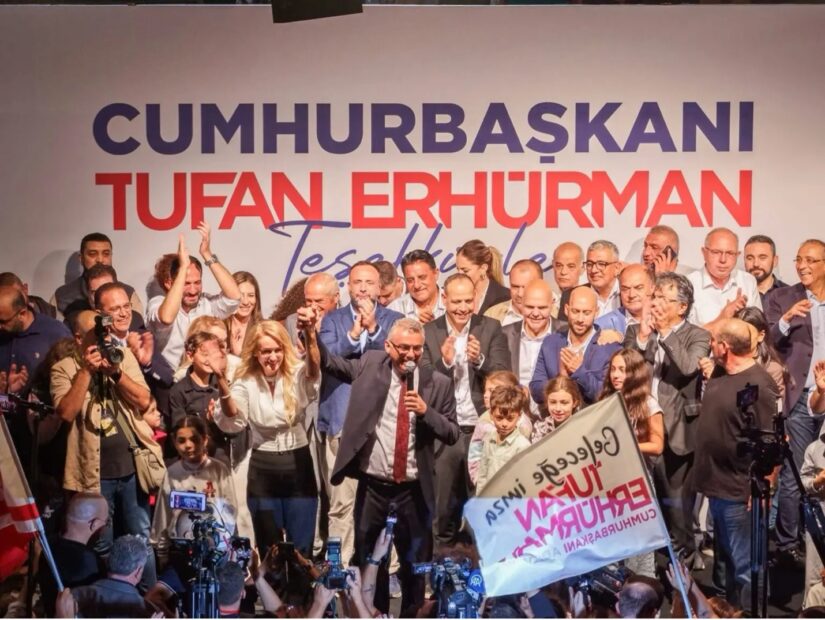
Image: President Erhürman celebrating victory (Source: Medyascope)
Turkish President Erdoğan immediately congratulated President Erhürman, and stated that “as Türkiye, we will continue to defend the sovereignty rights and interests of TRNC on all kinds of platforms together with our Turkish Cypriot brothers,” signaling that the outcome of the election will not pose a problem from a Turkish perspective despite some media outlets claiming otherwise. On one hand, the victory of President Erhürman exhilarated the reunificationists. On the other, the narrative that Erhürman sought to sever ties with Türkiye gained traction on the two-state policy supporters’ side. An interview conducted by Sabahattin İsmail, a nationalist and a prominent Turkish Cypriot journalist who once served as an advisor to President Denktaş, with Tufan Erhürman before the elections took place surfaced, resulting in lowered anxieties of Turkish Cypriot nationalists. According to the interview, President Erhürman has a set of principles that the Greek Cypriot side must agree to unconditionally for talks to resume:
- The Greek Cypriot side must formally recognize Turkish Cypriots’ political equality, including rotational presidency and a Turkish Cypriot veto in all state institutions.
- Talks cannot continue indefinitely. A strict timeline of no more than one year must be set before any negotiations begin.
- Negotiations must be focused on concrete outcomes, with all previously agreed points between the two sides remaining valid.
- Before talks start, the UN must guarantee what status the TRNC will hold if the Greek Cypriot side walks away – including recognition of the 3 Ds: direct travel, direct trade and direct contact.
- The guarantor rights of Türkiye are untouchable, protected by a 2014 parliamentary resolution. The final say on guarantees and troop presence rests with Türkiye.
- Crans-Montana cannot be the restart point. Only agreements reached up to that point are valid: the Guterres Framework is no longer applicable.
Domestically, Erhürman raised the expectations but the task ahead is not a small one. He now needs to rebuild trust with Türkiye while asserting domestic decision-making, revive negotiations without appearing submissive to Greek Cypriot or international pressure and restore institutions, tackle corruption and stabilize the economy under inflationary stress. Early signs suggest Erhürman will focus first on domestic governance reforms, improving transparency, reducing partisanship in appointments, and strengthening public institutions, before pushing for major diplomatic moves. The approach reflects his belief that credibility abroad begins with credibility at home.
For Ersin Tatar and his allies, the election result represents a setback but not necessarily an erasure. His party UBP still holds a majority in the parliament with a prime minister from UBP. His term reshaped Turkish Cypriot political identity, normalizing discourse around sovereignty and recognition. Even in defeat, that narrative retains a substantial following, especially among nationalist and conservative voters who distrust renewed talks. Thus, Erhürman’s administration inherits not only a divided economy but a divided political imagination — between those who seek integration and those who fear dilution of identity.
What comes next?
Tufan Erhürman’s victory has been hailed as a turn toward moderation and institutional seriousness. Yet it would be premature to declare a new era. The constraints that shaped his predecessors remain: limited international recognition, military and financial dependence on Türkiye, and an entrenched geopolitical deadlock. It is obvious that the rhetoric around President Erhürman being almost “anti-Türkiye” was used to delegitimize his candidacy in the run to the presidency. However, after finding out what his principles are for the resumption of talks, a change in the status quo seems highly unlikely.
First of all, both President Erhürman and Türkiye realize that without Türkiye’s patronage there is no leverage TRNC holds. Second, the far-right nationalist National People’s Front (ELAM) is increasing its foothold in Greek Cypriot politics. According to PolitPro, the current election trend shows that ELAM increased its votes from 6.8% to 15.9% since the last elections which further complicates renewed talks. Third, although the Greek Cypriot side wants to meet with Erhürman as soon as possible, and his election received commendations from the EU, it does not take an expert to assess that his set conditions will not be accepted by the Greek Cypriots.
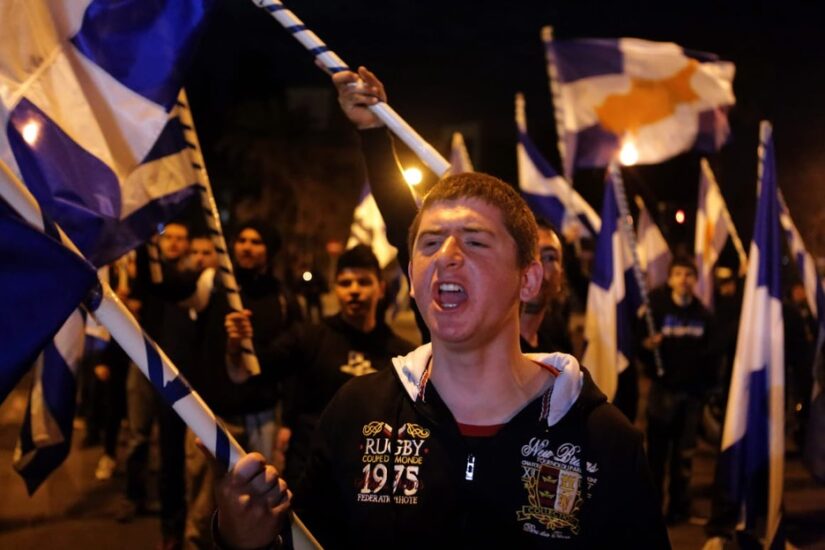
Image: Members of ELAM at a protest (Source: Politico)
The frozen conflict on the island of Cyprus, as was proven time and again by history, moves in cycles. If both sides have leadership in charge that wish to promote inter-communal discussions to resolve their differences, the atmosphere warms up. One or the other side ends up walking out of the discussions. If one side or both sides have nationalist governments, the talks come to a halt. This cyclical pattern has characterized intercommunal relations since 1974. It would be best to keep this in mind when thinking about the future. Ultimately, Erhürman’s domestic reform agenda, focused on governance rather than grand diplomacy, may prove more consequential for the Turkish Cypriot community than any renewed round of talks destined to circle back to the familiar stalemate.
Author: Rayan D. Sol


